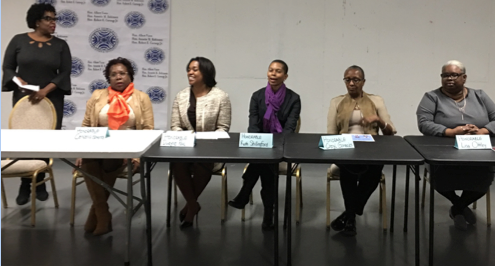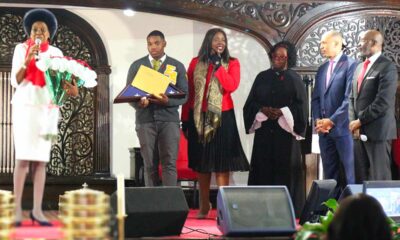Community News
Black Female Judges Converge in Bed-Stuy

A panel of six African-American female Brooklyn judges convened on Saturday, March 24 at the Quincy Street Senior Citizens Residence to discuss their roles, responsibilities and advice. As part of the meeting of the Vanguard Independent Democrats Association (VIDA), this Women’s History Month exhibit of “Advancing Equality through the Judiciary” drew additional judges, politicians, community members and residents to the community room.
The agenda highlight was when VIDA V.P. Honorable Annette Robinson invited the community “to interact [with judges] in a positive way and know what to do when you go before them.”

Judge Lisa Ottley
Hon. Lisa S. Ottley. A former supervising judge is currently Acting Justice of the Supreme Court (Guardianship Part). “If you put your affairs in order beforehand, such as health care proxy, a living will and a power-of-attorney, you probably, in all likelihood, will not have to be in my court.” Ottley decides whether people are incapacitated and need someone to govern their person or their property from jewelry to real estate. She advises that wishes be in writing so loved ones know what to do. (She is up for reelection.)

Judge Cheryl Gonzales
Hon. Cheryl J. Gonzales. Supervising judge of fifteen judges in Brooklyn Housing Court’s three parts: #1 Resolution Part where landlords and tenants resolve disputes; #2 Trial Part; #3 Housing Part (H.P.) where tenants bring landlords to court for repairs or for harassment. She also emphasized two exciting developments: Universal Right to Counsel (now active in 3 zip codes: 11207, 11225, 11221); eligible tenants receive attorney advice or representation. There have been far fewer orders to “show cause” and more tenants asking for more time. As a result, this initiative will spread to other zip codes in the future. In addition, plans are underway for a new housing court with a construction completion date of 2021 or 2022.
 Hon. Ruth Shillingford. President of Judicial Friends Assoc. of African-American Judges to ensure diversity in the system. She presides over Supreme Court/Criminal Court, all felony matters with the exception of homicides and racketeering. She hopes to see more families and friends in attendance during proceedings. “A family’s presence impacts bail and ensures justice is carried out.” She is also optimistic about increased diversity but currently in Brooklyn Supreme Court Criminal Term, “Not a single Black male judge presides.”
Hon. Ruth Shillingford. President of Judicial Friends Assoc. of African-American Judges to ensure diversity in the system. She presides over Supreme Court/Criminal Court, all felony matters with the exception of homicides and racketeering. She hopes to see more families and friends in attendance during proceedings. “A family’s presence impacts bail and ensures justice is carried out.” She is also optimistic about increased diversity but currently in Brooklyn Supreme Court Criminal Term, “Not a single Black male judge presides.”

Judge Deweynie E. Paul
Hon. Deweynie E. Paul. In family court, she presides over custody, visitation and family offense cases (orders of protection). In addition, her court hears issues pertaining to guardianships for minors, certification for US visas for immigrant victims of domestic violence and abandoned child immigrants. She also decides cases involving private adoptions and juvenile delinquency.
Hon. Cenceria Edwards. After spending two years in criminal court, she now presides over civil court cases involving consumer debt, student loans, auto loans, post-eviction debt and personal family issues. She also hears cases involving utility debt and name changes. She advises defendants to take advantage of all the programs the courts offer.
Below are a few of the questions panelists answered:
Question: What is the difference between appointments and elections?
Gonzales: After submitting an application, undergoing six interviews, the mayor appoints judges in criminal court and family court after successfully undergoing six interviews over the course of a year. Housing court judges must be appointed by an administrative judge and undergo six interviews. The governor also appoints judges who serve in the city. They serve for ten years.
Edwards: A candidate must practice ten years of law, submit petitions and be active in the community.
Question. What basic documents we must have so family is not in your court fighting over our assets?
Ottley: Health care proxy which indicates measures hospital should take to keep you alive (take the form with you from the hospital), a living will and power-of-attorney to handle all of your affairs.
Question: When can we come visit your court?
Answer: Anytime. Courts are public places, except for family court where judges exercise their personal discretion about admitting spectators. In general, the public is invited.
Question: What do you wish African-American families knew when they entered your court?
Sheares: “I wish they would come to more forums like this, so they are less nervous.”
Edwards: Pay attention to the procedures, how the judge reacts, and you learn something that will help your case. There are so many self-help desks to take advantage of.
Ford: You should know you have a right to counsel. Ask the judge for an adjournment if you are not prepared. You may even be entitled to free counsel.
Shillingford: Don’t be afraid to ask your attorney about what will happen during the process and what’s going on with your case. If your attorney is not willing to answer your questions, make a request for new assignment of counsel.
Gonzales: Be prepared. Bring your documents to back up what you say.
Ottley: Know what you’re going to say to the judge. If you’re not prepared, ask for an adjournment.
Question: Why do cases languish so long in landlord-tenant court?
Answer: We have only fifteen judges. The trial judges sometimes cover for the resolution judges when they’re out or on vacation. I have over 200 cases in trial court right now and not enough judges.
Question: Have you seen an increase in the number of cases in housing court?
Answer: We handled 70,000 cases and that’s a decrease. Practice is changing. People are not settling cases like they used to. There are trials.
Question: If the courts have limited resources, how can they afford to make resources available for tenants to avoid eviction?
Answer: Homelessness is not something we want to contribute to. We try to keep people in their homes, so we don’t contribute to homelessness.
Question: How can I discharge student loan debt?
.
Answer: Don’t hide the papers when you receive them. Answer the papers. There is a wave of plaintiffs bringing requests for relief of student loan debt and the question before the court is who owns the debt. You must litigate the case to find out if the debt is signed. Is there a note? Sometimes agencies are willing to settle for a percentage of the debt.
Question: How do you resolve mold issues in the home?
Answer: Come to the courts and start an HP action for $45 or ask for fee waiver.
Question: Is leniency toward tenants perceived or on the books?
Answer: Depending on where you stand, you may see the court as biased, especially if they don’t rule in your favor, but every judge tries to maintain a balance, so no one is hurt.
Question: What if you find your lawyer is not representing you well?
Answer: Go to the Character and Fitness Committee. Bring an action in a civil court to get recovery money. If the issue is legal or ethical, take the issue to a Grievance Committee.
Question: Is there more fairness in the judicial system now that Black women are there?
“We all take an oath to carry out justice fairly for everyone.”
“As a Black judge, I understand the culture, so I do make a difference.”
“Diversity on the bench is important. . . for the broader community of judges who can educate their peers.”
“When people walk into my courtroom and see a Black judge, people feel reassured.”
“There is implicit bias. . . in family court, we have training and workshops about perception.”
“When I see disparities in offers made to defendants, I question why.”
I know judges who have changed their names to sound like the prevailing culture. Someone who campaigned in our community did not put her face on her flyer but used red, black and green colors. People play the race card all the time. You don’t always know exactly who’s on the ballot, but you have to make it your business to find out.
“Diversity applies to the jury box also. We have to be in the room to explain our culture to jurors who may not be familiar with it. Their ignorance can put someone in jail.”
At the conclusion, the room responded with applause in appreciation for an informative exchange. As Joan Brown, Chaplain of the Tenants’ Quincy Senior Residence said, “You have to come out for these things and find out what’s going on, so you can grow and make life better for yourself or for someone else.”





